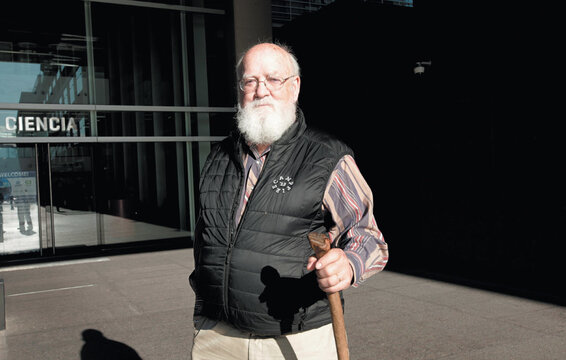"Extracts from Addresses to the Academy of Fine Ideas
(published in WS's third volume of poetry, Parts of a World, 1942)
i
A crinkled paper makes a brilliant sound.
The wrinkled roses tinkle, the paper ones,
And the ear is glass, in which the noises pelt,
The false roses – compare the silent rose of the sun
And rain, the blood-rose living in its smell,
With this paper, this dust. That states the point.
Messieurs,
It is an artificial world. The rose
Of paper is of the nature of its world.
The sea is so many written words; the sky
Is blue, clear, cloudy, high, dark, wide and round;
The mountains inscribe themselves upon the walls.
And, otherwise, the rainy rose belongs
To naked men, to women naked as rain.
Where is that summer warm enough to walk
Among the lascivious poisons, clean of them,
And in what covert may we, naked, be
Beyond the knowledge of nakedness, as part
Of reality, beyond the knowledge of what
Is real, part of a land beyond the mind?
Rain is an unbearable tyranny. Sun is
A monster-maker, an eye, only an eye,
A sharpener of shapes for only the eye,
Of things no better than paper things, of days
That are paper days. The false and true are one.
ii
The eye believes and its communion takes.
The spirit laughs to see the eye believe
And its communion take. And now of that.
Let the Secretary for Porcelain observe
That evil made magic, as in catastrophe,
If neatly glazed, becomes the same as the fruit
Of an emperor, the egg-plant of a prince.
The good is evil’s last invention. Thus
The maker of catastrophe invents the eye
And through the eye equates ten thousand deaths
With a single well-tempered apricot, or, say,
An egg-plant of good air.
My beards, attend
To the laughter of evil; the fierce chicanery
With the ferocious chu-chot-chu between, the sobs
For breath to laugh the louder, the deeper gasps
Uplifting the completest rhetoric
Of sneers, the fugues commencing at the toes
And ending at the finger-tips…it is death
That is ten thousand deaths and evil death.
Be tranquil in your wounds. It is good death
That puts an end to evil death and dies.
Be tranquil in your wounds. The placating star
Shall be the gentler for the death you die
And the helpless philosophers say still helpful things.
Plato, the reddened flower, the erotic bird.
iii
The lean cats of the arches of the churches,
That’s the old world. In the new, all men are priests.
They preach and they are preaching in a land
To be described. They are preaching in a time
To be described. Evangelists of what?
If they could gather their theses into one,
Collect their thoughts together into one,
Into a single thought, thus: into a queen,
An intercessor by innate rapport,
Or into a dark-blue king, un roi tonnerre,
Whose merely being was his valiance,
Panjandrum and central heart and mind of minds –
If they could! Or is it the multitude of thoughts,
Like insects in the depths of the mind, that kill
The single thought? The multitudes of men
That kill the single man, starvation’s head,
One man, their bread and their remembered wine?
The lean cats of the arches of the churches
Bask in the sun in which they feel transparent,
As if designed by X, the per-noble master.
They have a sense of their design and savor
The sunlight. They bear brightly the little beyond
Themselves, the slightly unjust drawing that is
Their genius: the exquisite errors of time.
iv
On an early Sunday in April, a feeble day,
He felt curious about the winter hills
And wondered about the water in the lake.
It had been cold since December. Snow fell, first,
At new year and, from then until April, lay
On everything. Now it had melted, leaving
The gray grass like a pallet, closely pressed;
And dirt. The wind blew in the empty place.
The winter wind blew in an empty place –
There was that difference between the and an,
The difference between himself and no man,
No man that heard a wind in an empty place.
It was time to be himself again, to see
If the place, in spite of its witheredness, was still
Within the difference. He felt curious
Whether the water was black and lashed about
Or whether the ice still covered the lake. There was still
Snow under the trees and on the northern rocks,
The dead rocks not the green rocks, the live rocks. If,
When he looked, the water ran up the air or grew white
Against the edge of the ice, the abstraction would
Be broken and winter would be broken and done,
And being would be being himself again,
Being, becoming seeing and feeling and self,
Black water breaking into reality.
v
The law of chaos is the law of ideas,
Of improvisations and seasons of belief.
Ideas are men. The mass of meaning and
The mass of men are one. Chaos is not
The mass of meaning. It is three or four
Ideas or, say, five men or, possibly six.
In the end, these philosophic assassins pull
Revolvers and shoot each other. One remains.
The mass of meaning becomes composed again.
He that remains plays on an instrument
A good agreement between himself and night,
A chord between the mass of men and himself,
Far, far beyond the putative canzones
Of love and summer. The assassin sings
In chaos and his song is a consolation.
It is the music of the mass of meaning.
And yet it is a singular romance,
This warmth in the blood-world for the pure idea,
This inability to find a sound,
That clings to the minds like that right sound, that song
Of the assassin that remains and sings
In the high imagination, triumphantly.
vi
Of systematic thinking…Ercole,
O, skin and spine and hair of you, Ercole,
Of what do you lie thinking in your cavern?
To think it is to think the way to death…
That other one wanted to think his way to life,
Sure that the ultimate poem was the mind,
Or of the mind, or of the mind in these
Elysia, these days, half earth, half mind;
Half-sun, half thinking of the sun; half sky,
Half desire for indifference about the sky.
He, that one, wanted to think his way to life,
To be happy because people were thinking to be.
They had to think it to be. He wanted that,
To face the weather and be unable to tell
How much of it was light and how much thought,
In these Elysia, these origins,
This single place in which we are and stay,
Except for the images we make of it,
And for it, and by which we think the way,
And, being unhappy, talk of happiness
And, talking of happiness, know that it means
That the mind is the end and must be satisfied.
It cannot be half earth, half mind; half sun,
Half thinking; until the mind has been satisfied,
Until, for him, his mind is satisfied.
Time troubles to produce the redeeming thought.
Sometimes at sleepy mid-days it succeeds,
Too vaguely that it be written in character.
vii
To have satisfied the mind and turn to see,
(That being as much belief as we may have,)
And then to look and say there is no more
Than this, in this alone I may believe,
Whatever it may be; then one’s belief
Resists each past apocalypse, rejects
Ceylon, wants nothing from the sea, la belle
Aux crinolines, smears out mad mountains.
What
One believes is what matters. Ecstatic identities
Between one’s self and the weather and the things
Of the weather are the belief in one’s element,
The casual reunions, the long-pondered
Surrenders, the repeated sayings that
There is nothing more and that it is enough
To believe in the weather and in the things and men
Of the weather and in one’s self, as part of that
And nothing more. So that if one went to the moon,
Or anywhere beyond, to a different element,
One would be drowned in the air of difference,
Incapable of belief, in the difference.
And then returning from the moon, if one breathed
The cold evening, without any scent or the shade
Of any woman, watched the thinnest light
And the most distant, single color, about to change,
And naked of any illusion, in poverty,
In the exactest poverty, if then
One breathed the cold evening, the deepest inhalation
Would come from that return to the subtle center.
viii
We live in a camp….Stanzas of final peace
Lie in the heart’s residuum….Amen.
But would it be amen, in choirs, if once
In total war we died and after death
Returned, unable to die again, fated
To endure therafter every mortal wound,
Beyond a second death, as evil’s end?
It is only that we are able to die, to escape
The wounds. Yet to lie buried in evil earth,
If evil never ends, is to return
To evil after death, unable to die
Again and fated to endure beyond
Any mortal end. The chants of final peace
Lie in the heart’s residuum.
How can
We chant if we live in evil and afterward
Lie harshly buried there?
If earth dissolves
Its evil after death, it dissolves it while
We live. Thence come the final chants, the chants
Of the brooder seeking the acutest end
Of speech: to pierce the heart’s residuum
And there to find music for a single line,
Equal to memory, one line in which
The vital music formulates the words.
Behold the men in helmets borne on steel,
Discolored, how they are going to defeat.”
~~Wallace Stevens




